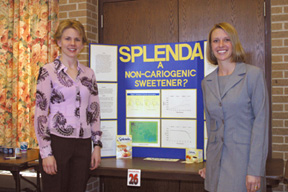 |
Erika Zink and Jennifer Kurth placed first in the dental student category. Photos by Peggy Cain, College of Dentistry. |
Keynote speaker Lawrence Tabak, D.D.S., Ph.D., director of the National Institute of Dental and Craniofacial Research, addressed the strides being made in the study and mapping of human genes that will revolutionize the field of oral health.
The college also recognized individuals during the awards and honors convocation for academic excellence and research honors. For some students, the event culminates at least six months of work on a required research project. Students were eager to explain their projects to faculty judges who hovered with their clipboards.
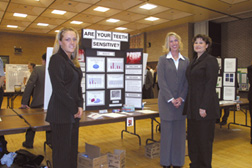 |
From left to right are senior dental hygiene students, Gina Kissel, Julie Jane and Amy Dayhoff, by their research project titled “Are your Teeth Sensitive?” |
Poster presentations
Senior dental hygiene students, Julie Jane, Amy Dayhoff and Gina Kissel, were enthusiastic about their research poster titled, “Are your teeth sensitive?” The display was a visual representation of the results of their 20-page paper.
“A lot of people have sensitive teeth,” Kissel said. “They assume there’s nothing that can be done about it but there is, including the application of dental varnishes can be applied easily at low cost. Many people also assume it’s a cavity if they have sensitivity.”
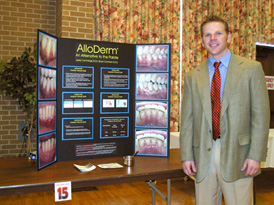 |
Lewis Cummings, D.D.S., and Bryan Cochran, D.D.S. (not pictured) were first place winners in the post-graduate category. |
Sparking interest in research
Brian Lange, Ph.D., professor of dental practice management, said the event cultivates a desire to do research. “For someone who’s never had a research interest, some of the students have top-notch stuff,” Dr. Lange said. “They’ve learned research techniques and how to collaborate with faculty and other students which is just as important in research as knowing the topic. They also get to see another side of the faculty they don’t normally see.”
Near a display titled, “Cost effective follow-up assessment for the use of intraoral orthotics in managing obstructive sleep apnea,” senior dental students, Anh Nguyen and Craig Braun, waited for their turn with the judges.
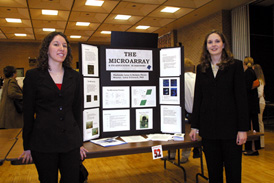 |
First place winners in the dental hygiene category were Nichole Pierce and Phalisady Latas. |
Braun said the scientific program was an opportunity to display new ideas and learn new things. “It’s very rewarding,” he said.
Scoring high on national exams
John Reinhardt, D.D.S., dean of the UNMC College of Dentistry, said he was impressed, as always, with the students’ table clinics and that so many family and friends attended.
He also was pleased to announce that the senior dental students’ scored third in the nation out of 55 dental schools on their National Board Exam Part II. The written exam covers clinical subjects. Students have consistently ranked high on national exams.
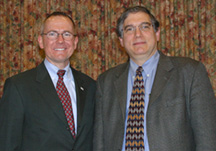 |
John Reinhardt, D.D.S., dean of the UNMC College of Dentistry, and Lawrence Tabak, D.D.S., Ph.D., director of the National Institute of Dental and Craniofacial Research. |
Keynote impressed
Dr. Reinhardt said he was thrilled to have someone of Dr. Tabak’s stature speak at Professionals’ Day. “It’s wonderful to have him here and learn about our research here…to see our growing research program.”
Assistant Dean for Research Jeffrey Payne, D.D.S., and F. Gene and Rosemary Dixon Endowed Chair in Dentistry, coordinated Dr. Tabak’s visit and said he “was impressed with the research we’re conducting and was equally impressed with the facility. He went away with a very positive outlook on our research program, which we’re recognized nationally for, as well as what we’ve accomplished here.”
Before Dr. Tabak delivered the Frank M. Wentz Memorial Lectureship, he looked at the students’ research projects.
|
Dr. Raymond Steinacher Award — Presented to Melissa Morris, student. The award recognizes outstanding didactic and clinical skills in prosthodontics. College of Dentistry Service Philosophy Awards — Presented to Henry St. Germain, D.M.D., department chair, adult restorative dentistry; staff award presented to Kathy Miller, staff secretary; student award presented to Jamar Anderson. The award recognizes those who are committed to anticipating and fulfilling the needs and requirements of faculty, staff, students, patients, and community, while carrying out a state-wide mission of excellence in education, research, health care, and service. College of Dentistry Excellence in Teaching Award – Presented to Ronald Attanasio, D.D.S. The award recognizes faculty who have made teaching a high priority among their professional duties. Faculty Recognition
2003 Table clinic awards
Dental
Post-graduate
|
Though most graduates pursue clinic practices, he said, one of his charters is to convince dental professionals to go into an academic setting or research fulltime. “It would be very nice to entice a subset of them. There’s some folks here that have the potential if they chose,” he said. “These sorts of things make me the happiest — students showing what their accomplishments are. There’s some great quality here. I asked some complicated questions and they gave me articulate answers. I think they’re very engaged in what they’re doing. It looks like the future is in good hands.”
Replacing lost teeth, function
During his presentation, titled, “The Post-genomic era enters the mouth,” Dr. Tabak’s said dental researchers are forging relationships with engineers and other scientists to come up with more strategies to replace lost teeth or lost function.
Mapping of the entire human gene, scheduled for completion in April, will solve the puzzle of complex diseases, including oral health disease, he said. He emphasized how critical research is to bear the fruits of genetic discoveries and told the audience that dental schools, such as theirs, are in a unique position to translate research into practice.
“By studying genetics, we now really understand the progression that occurs in oral cancer,” Dr. Tabak. “Knowing this progression is important because success of treatment is tied in with early detection. Although it’s not in widespread use yet, we can use saliva from the mouth to detect DNA changes. It ultimately could be used during community health screenings.”
Dr. Tabak’s team
Dr. Tabak heads a team of 450 scientists and staff with an annual budget of $350 million at the institute in Bethesda, Md., whose mission it is to promote the general health of the American people by improving oral, dental and head and face health. Through research and training of scientists, it aims to promote health, prevent disease and conditions, and develop new diagnostics and therapeutics.
“The promises of the post-genomic era are real and will impact each of your professional lives,” Dr. Tabak said.
Looking ahead
He envisions the day patients put a card containing their genes in a reader which will tell them what drugs they can safely take. “This is a reality because third-party payers (insurance companies) want to reduce risk of death,” Dr. Tabak said. “This information could tell us if the patient would need a lower or higher dose of a certain medication.
“In the future, I believe there will be more biologically-based restoration, using things like dental stem cells to repair and replace teeth and the application of biometrics. Ultimately the goal is to create a biological tooth replacement using stem cells,” Dr. Tabak said.
Biometrics is the study of application of math and statistics to the analysis and solution of problems in the fields of biology and other health sciences.
“Dental pulp has its own set of stem cells. It can create the dentin of the tooth and already the possibility exists that it can repair or recreate dentin,” he said. “Stem cells can be ‘teased’ into forming other tissue and multiple parts of the body. Next, we have to figure out what can recreate enamel. We could eventually create an artificial tooth.”
Scientists at the institute also are trying to create artificial salivary glands to alleviate side effects of dry mouth, a condition caused by radiation treatment for head or neck cancers or other diseases and inflammation, which create dry mouth and dry eyes.
Due to the increase in medications among an aging population, he expects more older adults will suffer from dry mouth in the future.
“The disease creates devastating clinical problems,” Dr. Tabak said. “Think about having to carry a bottle of water wherever you go. We don’t have very good treatment for this. An artificial gland could replace the lost salivary function.”